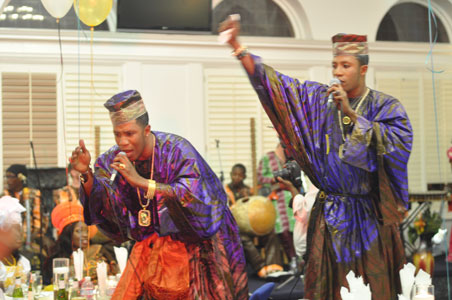 The sounds of drums being struck by adroit hands, the revelry of music, the stomping of rhythm, heralded the presence of a distant tradition, taking root, growing, branching into the streets and into the lives of the people of the Bay Area. On June 18th, 2011, Nuit de Bazin “Jama Ak Bolo”: Bringing Peace, Love and Unity, was held in downtown Oakland, featuring Sekhou Senegal, a West African ensemble. This affair was hosted by Ousseynou and Assane Kouyate, internationally acclaimed West African griots, affectionately known as “the twins,” and it showcased the music and dance talents from the regions of West Africa. The event was attended by nationals from Burkina Faso, Gambia, Guinea, Liberia, Mali, Senegal, as well as the Bay Area, and it was made possible by a grant from ACTA’s Living Cultures Grants Program.
The sounds of drums being struck by adroit hands, the revelry of music, the stomping of rhythm, heralded the presence of a distant tradition, taking root, growing, branching into the streets and into the lives of the people of the Bay Area. On June 18th, 2011, Nuit de Bazin “Jama Ak Bolo”: Bringing Peace, Love and Unity, was held in downtown Oakland, featuring Sekhou Senegal, a West African ensemble. This affair was hosted by Ousseynou and Assane Kouyate, internationally acclaimed West African griots, affectionately known as “the twins,” and it showcased the music and dance talents from the regions of West Africa. The event was attended by nationals from Burkina Faso, Gambia, Guinea, Liberia, Mali, Senegal, as well as the Bay Area, and it was made possible by a grant from ACTA’s Living Cultures Grants Program.
Nuit du bazin translates as night of the African brocade fabric, referring to an evening of elegance that prominently displays the starchy textile commonly referred to by the Arabic word, damask. The localized African name of bazin was applied to the material to highlight the unique combinations of colors and designs that are worn by many people in the different regions of West Africa. Producing this textile is a specialized skill and a labor intensive process. The subsequent garments are renowned for a vibrancy of colors, rich embroidery, the stiff feel of the material, and the reflective shine they produce. The use of bazin in the name of the event signals that music and dancing are only some aspects of this affair, for this was also a time to celebrate the rich material culture of West Africa, allowing people to dress in their fineries, adding to the beauty of the event.
Doors opened at 8pm, providing opportunities to socialize while introductory acts demonstrated their talent. Around 10:30pm, the musical performances were well underway. Numerous guest artists from different regions of West Africa were in attendance, performing side by side with American born musicians, playing traditional West African instruments as well as some European instruments, blending African melodies with American flavors, showcasing the influences of African and American music. Among the guest musicians was Karamo Susso, a native of Mali and, like the twins hosting the event, a professional griot, who are representatives of the West African bardic tradition and members of a caste of artisans who share the histories of their people through song, often playing the kora (a harp-lute) for musical accompaniment. The griot tradition has a particular salience in representing the crossing of African and American cultures as it has been recognized by folklorists and ethnomusicologists as a precursor to African-American oral traditions, and Afrika Bambaataa, considered to be the godfather of Hip Hop, acknowledged the griot tradition as being a direct antecedent to American rap traditions.
By 11:30pm, Ousseynou and Alasane Kouyate were on the floor surrounded by guests as they sang songs of divine praise as well as songs meant to honor people in the assembled crowd. Coming from a long and honored line of griots, they excited the crowd with their energizing, performative lyricism, and their electrifying stage presence, jumping on tables and chairs, bringing the audience to life. In the past, communities recognized the important contributions of the griots by giving them livestock or land, usually on behalf of the king. In keeping with the heart of this tradition, audience members would periodically come up and give them money.
The energy and vibrancy of the evening continued well into the night as the venue was filled with people, moving, laughing, and enjoying themselves, carrying on their traditions for future generations.
